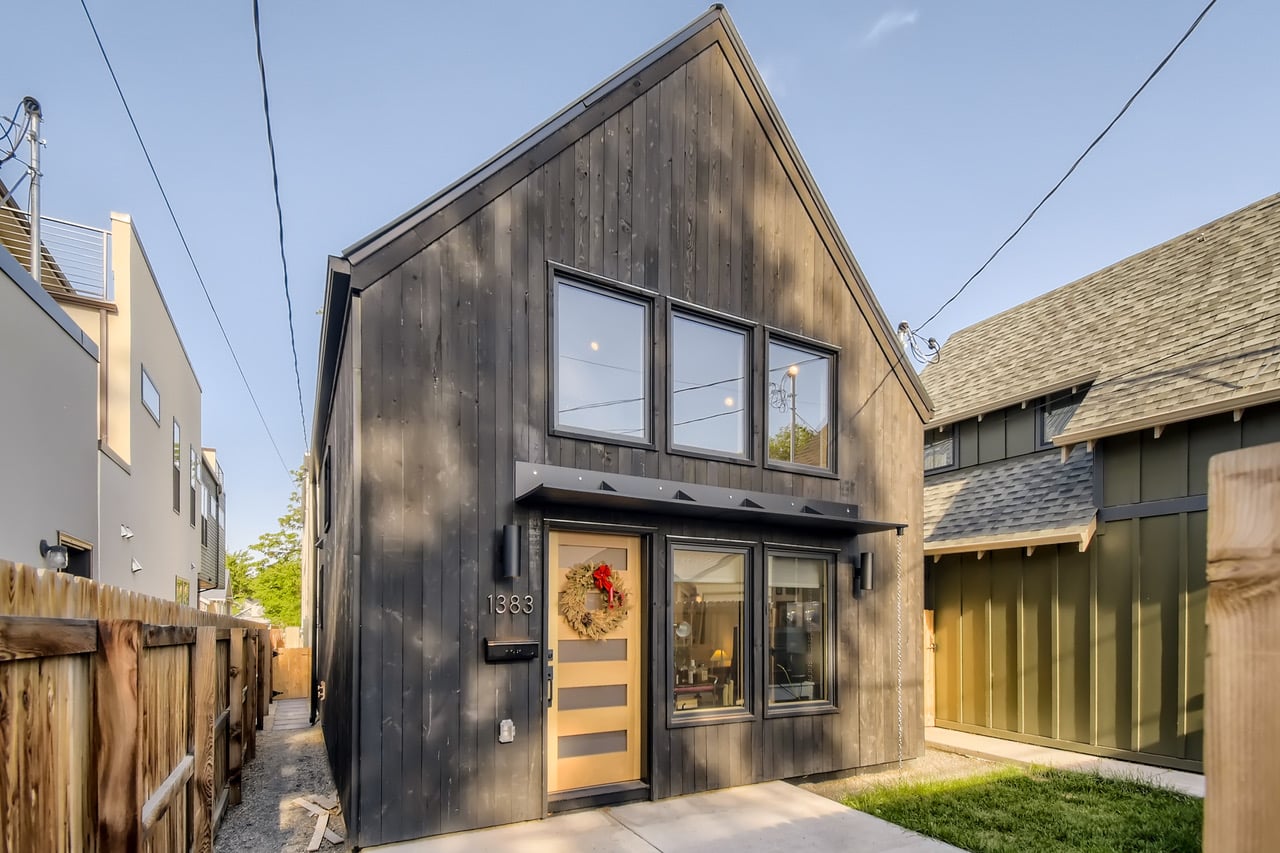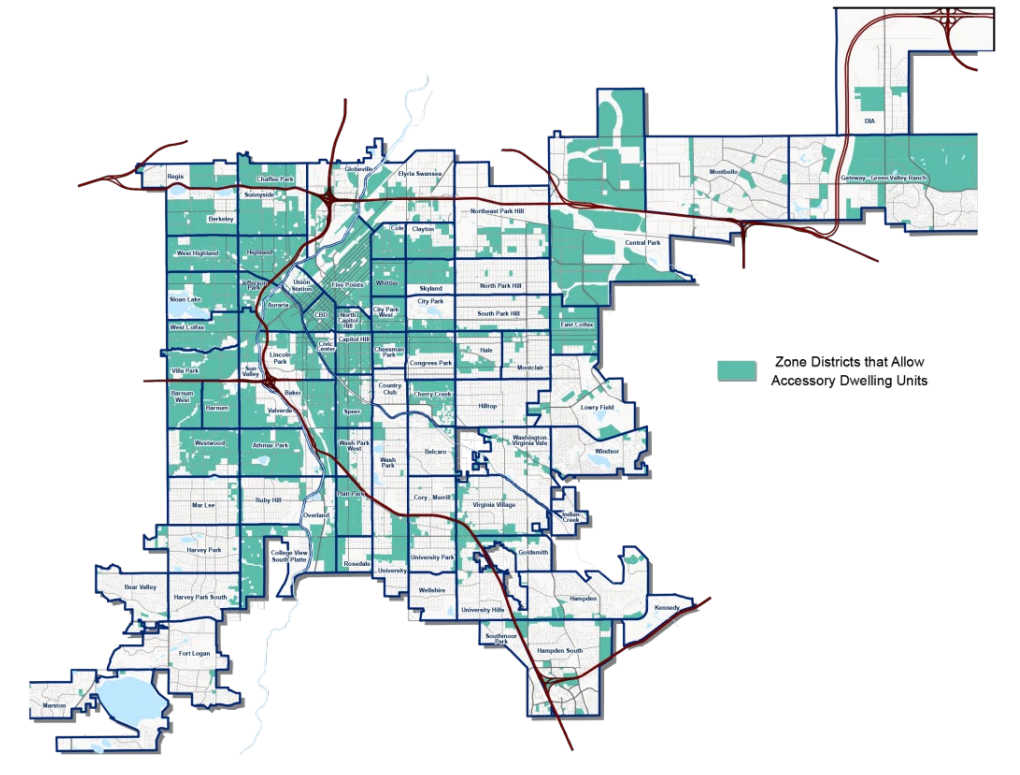
An ADU constructed at 1383 Raleigh St. in Denver by L&D Construction. (Courtesy L&D Construction)
Denver and surrounding suburbs are considering changes that would make it easier to build accessory dwelling units, although a measure being considered by the state Legislature could supersede their efforts.
In the Mile High City, Mayor Mike Johnston’s administration, along with council members Chris Hinds, Sarah Parady and Darrell Watson, is spearheading a push to allow ADUs on any property in the city that is zoned residential.
“One of our top priorities for the year is to build or preserve 3,000 units of affordable housing, and making it easier for neighbors to build ADUs is a great first step,” Johnston said in a statement.
The effort would replace what has been a somewhat piecemeal approach in recent years. Since 2020, the council has rezoned multiple entire neighborhoods, such as Sloan’s Lake and West Highland, to allow ADUs. But not all neighborhoods have embraced the concept. Councilwoman Amanda Sawyer said last year that the Montclair neighborhood, for example, indicated it wasn’t interested in seeing the change there.
Currently, 35 percent of the city’s land area is zoned to allow ADUs, concentrated in central and northwest Denver, according to city staff. Another 36 percent is zoned residential but does not have ADU zoning.
Property owners in the latter area are often still able to build an ADU, but to do so they must request the council rezone their individual lot, which entails a $1,000 fee. About 25 to 40 properties have gone through that process annually in recent years.
ADUs, sometimes called “granny flats,” often back up to alleys and are popular with those who want to keep a family member close or gain a source of income by renting the new housing unit out. Between 2016 and November 2023, Denver issued 456 permits for ADU construction, according to city figures previously provided to BusinessDen.

A map showing, in green, where zoning currently allows ADUs in Denver. (Courtesy City of Denver)
In a council committee meeting this week, Hinds said the citywide measure makes sense because Denver is in a “housing crisis.”
“It really makes sense for us to allow the entire city to have gentle density,” he said.
Parady, meanwhile, noted that the state Legislature is considering a bill that “would require municipalities to allow ADUs, with certain parameters.”
“If it turns out we’re required to meet everything in the state bill, we may have to slightly adjust some of that aforementioned work around setbacks, those kinds of rules,” Parady told her colleagues. “But in general we’ll already be on track to authorize ADUs citywide, which is primarily what that state bill requires. And if that state bill doesn’t happen, then here we are doing our thing in Denver.”
Councilman Kevin Flynn, who represents a portion of southwest Denver that generally lacks alleys, voiced concern about the state bill, noting the city made changes last year to vary design standards for ADUs by neighborhood as part of an initiative called “ADUs in Denver.”
“That would strip away the ADUs in Denver work,” Flynn said of the state legislation. “It would tell us we are not permitted to come up with context-specific design standards. That’s of great concern to me.”
The state legislative session ends in May. The council expects to vote in August on its ADU measure.
Much of the rest of the council’s discussion last week revolved around how the city should notify property owners of the proposed change, and that, even if it is implemented, homeowners may still be unable to build an ADU if their homeowners association doesn’t allow them.
Denver is not the only city that is reconsidering ADU regulations. After months of deliberations, Lakewood City Council may vote in May on whether to ease its current ADU regulations, which planning commissioner Kip Kolkmeier said at a meeting have “very significant barriers.”
The proposed changes in the western suburb would allow the units to have more than one bedroom and increase the size limit from 700 square feet to 1,400. The property owner would also not be required to live in the dwelling unit, allowing them to be used as short-term rental properties.
Meanwhile, in the south, Centennial has been working on an ordinance to allow ADUs for over two years. But city leaders tabled the proposal earlier this month in light of the possibility that the state measure could become law.
BusinessDen staffer Maia Luem contributed reporting.

An ADU constructed at 1383 Raleigh St. in Denver by L&D Construction. (Courtesy L&D Construction)
Denver and surrounding suburbs are considering changes that would make it easier to build accessory dwelling units, although a measure being considered by the state Legislature could supersede their efforts.
In the Mile High City, Mayor Mike Johnston’s administration, along with council members Chris Hinds, Sarah Parady and Darrell Watson, is spearheading a push to allow ADUs on any property in the city that is zoned residential.
“One of our top priorities for the year is to build or preserve 3,000 units of affordable housing, and making it easier for neighbors to build ADUs is a great first step,” Johnston said in a statement.
The effort would replace what has been a somewhat piecemeal approach in recent years. Since 2020, the council has rezoned multiple entire neighborhoods, such as Sloan’s Lake and West Highland, to allow ADUs. But not all neighborhoods have embraced the concept. Councilwoman Amanda Sawyer said last year that the Montclair neighborhood, for example, indicated it wasn’t interested in seeing the change there.
Currently, 35 percent of the city’s land area is zoned to allow ADUs, concentrated in central and northwest Denver, according to city staff. Another 36 percent is zoned residential but does not have ADU zoning.
Property owners in the latter area are often still able to build an ADU, but to do so they must request the council rezone their individual lot, which entails a $1,000 fee. About 25 to 40 properties have gone through that process annually in recent years.
ADUs, sometimes called “granny flats,” often back up to alleys and are popular with those who want to keep a family member close or gain a source of income by renting the new housing unit out. Between 2016 and November 2023, Denver issued 456 permits for ADU construction, according to city figures previously provided to BusinessDen.

A map showing, in green, where zoning currently allows ADUs in Denver. (Courtesy City of Denver)
In a council committee meeting this week, Hinds said the citywide measure makes sense because Denver is in a “housing crisis.”
“It really makes sense for us to allow the entire city to have gentle density,” he said.
Parady, meanwhile, noted that the state Legislature is considering a bill that “would require municipalities to allow ADUs, with certain parameters.”
“If it turns out we’re required to meet everything in the state bill, we may have to slightly adjust some of that aforementioned work around setbacks, those kinds of rules,” Parady told her colleagues. “But in general we’ll already be on track to authorize ADUs citywide, which is primarily what that state bill requires. And if that state bill doesn’t happen, then here we are doing our thing in Denver.”
Councilman Kevin Flynn, who represents a portion of southwest Denver that generally lacks alleys, voiced concern about the state bill, noting the city made changes last year to vary design standards for ADUs by neighborhood as part of an initiative called “ADUs in Denver.”
“That would strip away the ADUs in Denver work,” Flynn said of the state legislation. “It would tell us we are not permitted to come up with context-specific design standards. That’s of great concern to me.”
The state legislative session ends in May. The council expects to vote in August on its ADU measure.
Much of the rest of the council’s discussion last week revolved around how the city should notify property owners of the proposed change, and that, even if it is implemented, homeowners may still be unable to build an ADU if their homeowners association doesn’t allow them.
Denver is not the only city that is reconsidering ADU regulations. After months of deliberations, Lakewood City Council may vote in May on whether to ease its current ADU regulations, which planning commissioner Kip Kolkmeier said at a meeting have “very significant barriers.”
The proposed changes in the western suburb would allow the units to have more than one bedroom and increase the size limit from 700 square feet to 1,400. The property owner would also not be required to live in the dwelling unit, allowing them to be used as short-term rental properties.
Meanwhile, in the south, Centennial has been working on an ordinance to allow ADUs for over two years. But city leaders tabled the proposal earlier this month in light of the possibility that the state measure could become law.
BusinessDen staffer Maia Luem contributed reporting.
